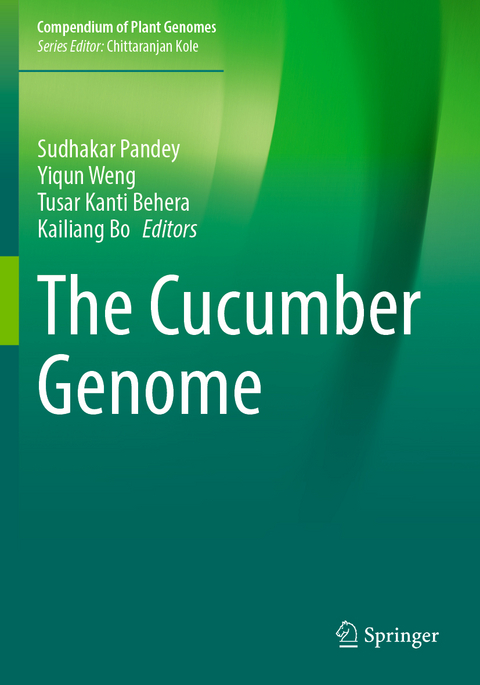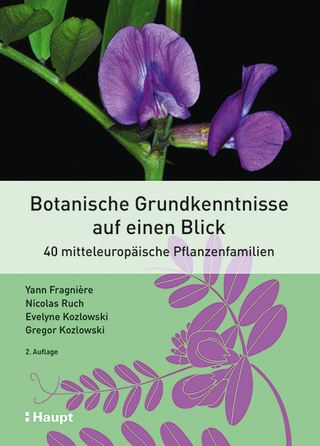
The Cucumber Genome
Springer International Publishing (Verlag)
978-3-030-88649-3 (ISBN)
This edited book presents the latest research on cucumber, its genetic resources and diversity, tissue culture and genetic transformation, mapping of economic genes and QTLs, whole genome sequencing, comparative genomics, and breeding strategies. The mechanism of sex expression, interspecific hybridization, and cell biology are also described. The book discusses the genome draft of cucumber and the application of genome editing.
This book is useful to the students, teachers and scientists in academia and relevant private companies interested in horticulture, genetics, breeding, and related areas.
lt;p>Dr. Sudhakar Pandey has 21 years of experience in vegetable breeding particularly on cucurbit crops and is presently working as a principal scientist at ICAR-Indian Institute of Vegetable Research, Varanasi. He has made significant contributions on the improvement of cucurbitaceous vegetables and was instrumental in developing 17 varieties in different cucurbitaceous vegetable crops. He is working mostly on genetics and molecular breeding of cucumber, pumpkin, and ash gourd. Dr. Pandey identified and characterized a new gene SH1 (SHORT HYPOCOTYL 1) responsible for regulating hypocotyl elongation in cucumber. His work on new SSR markers and QTLs for powdery mildew resistance and parthenocarpy fruit set in cucumber is widely cited. As a co-nodal officer of DUS on cucurbits and member of Taskforce, he developed DUS Testing Guidelines for pumpkin, cucumber, bottle gourd, bitter gourd, muskmelon, watermelon, and pointed gourd. He published over 75 research papers as author and co-author and 03 books. He is the recipient of prestigious awards like, ICAR Outstanding Multidisciplinary Team Research Award, Dr. Kriti S ingh L ife T ime A achievement award , Distinguished Agriculture Scientist Award (Horticulture), Young Scientist Award and Scientist of the Year. He is a fellow of National Academy of Agricultural Sciences, India, and Uttar Pradesh Academy of Agricultural Sciences, Lucknow.
Dr. Yiqun Weng is a research geneticist in the USDA-ARS Vegetable Crops Research Unit, and Professor of the Horticulture Department, University of Wisconsin at Madison, Wisconsin. He is a principal investigator for the USDA Cucumber Improvement Program focusing on cucumber germplasm enhancement. Research interests in his program include developing genetic and genomic resources for marker-assisted breeding, molecular mapping and cloning of horticulturally important genes and QTL, cucumber chromosome evolution and domestication, as well as efficient use of crop wild relatives for cucumber improvement. Since 2010, he has authored or co-authored over 100 papers in referred journals in these fields. He has also mentored/trained over 90 students, postdocs, and visiting scientists from nine countries.
Prof. Tusar Kanti Behera has 23 years of experience in vegetable breeding and is presently working as a Director at Indian Institute of Vegetable Research Institute, Varanasi, Uttar Pradesh. He bred 20 varieties/hybrids in different vegetable crops and isolated gynoecious lines in bitter gourd from its feral form. He is working mostly on genetics and molecular breeding of bitter gourd and cucumber. He developed Indian gynoecious cucumber lines using MAS. Awarded with several prestigious awards including Fulbright-Nehru Academic and Professional Excellence Fellowship, Hari Krishna Shastri Memorial Award, Best Teacher Award for Higher Education, Hooker Award. He is the Fellows of National Academy of Agricultural Sciences, Indian Society of Genetics and Plant Breeding, Indian Academy of Horticultural Science, India. He served as FAO International Consultant in Vegetable Breeding at Libya 2010 and Visiting scientist at the University of Wisconsin, Madison, USA. He published his research work in more than 50 research papers in international journals and edited three books. He has guided 16 postgraduate students for their thesis dissertations at Indian Agricultural Research Institute, New Delhi, India.Chapter 1. Importance, Distribution, Botany and Genetics.- Chapter 2. Genome Editing and Its Applications for Improvement.- Chapter 3. The Cucumber Genome - An Update.- Chapter 4. Molecular Mapping of Genes & QTLs for Plant Architecture and Fruit Traits in Cucumber (Cucumis sativus L.).- Chapter 5. Agrobacterium tumefaciens-Mediated Genetic Transformation in Cucumber.- Chapter 6. QTL Mapping for Abiotic Stress.- Chapter 7. QTL Mapping for Disease Resistance in Cucumber.- Chapter 8. Mapping for Quality Traits.- Chapter 9. Genome Evaluation of Cucumber in Relation to Cucurbit Family.- Chapter 10. Cyto-Molecular Genetics of Interspecific Hybridization in Cucumber.- Chapter 11. Cucumber Sex Expression: Aspects of Gene Interactions.- Chapter 12. Classical Genetics and Traditional Breeding.- Chapter 13. Biotechnological Innovations in Cucumber (Cucumis sativus L.) Development - Current Scenario and Future Perspectives.
| Erscheinungsdatum | 20.12.2022 |
|---|---|
| Reihe/Serie | Compendium of Plant Genomes |
| Zusatzinfo | XXIII, 199 p. 33 illus., 23 illus. in color. |
| Verlagsort | Cham |
| Sprache | englisch |
| Maße | 178 x 254 mm |
| Gewicht | 427 g |
| Themenwelt | Naturwissenschaften ► Biologie ► Botanik |
| Schlagworte | Cucumis sativus • Cucurbit Genomics • Genome sequence • Molecular Breeding • Molecular mapping • QTL mapping |
| ISBN-10 | 3-030-88649-2 / 3030886492 |
| ISBN-13 | 978-3-030-88649-3 / 9783030886493 |
| Zustand | Neuware |
| Informationen gemäß Produktsicherheitsverordnung (GPSR) | |
| Haben Sie eine Frage zum Produkt? |
aus dem Bereich


